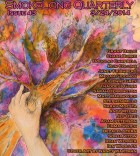One of the things I love about “Sparks” is the way you make use of an odd, idiomatic style of prose—one that takes on a nice and folksy (I mean that only in the best possible sense) quality, bringing to mind a nursery rhyme for adults. Was there a conscious effort on your part to develop this style of storytelling, and is it likewise one you adopt in most of your writing?
For this story, there was definitely a conscious effort to mimic a fairy tale or nursery rhyme. I often start stories with a line I’ve thought about in my head for a day or days. For “Sparks,” I worked on that first line for a while, trying to get it just right—so it comes out slightly wrong. There once was a man who all he could eat was sparks. The sentence is crafted to feel awkward and comforting at the same time. You’re pulled into a fairy tale but there’s something off about it. It’s embarrassing how long that line took me. I guess this is just a long way of saying that yes, there was a conscious effort to make the story sound and feel like this, and I’m terribly glad you caught it.
I should also note that “Sparks” is part of a series of short fairy-tale like stories (some other stories in the series which have already been published include “Dog Treats” and ”Flight.”) I’m not sure I adopt this style in most of my writing, but I certainly did in this story cycle.
I’m so glad there are more like “Sparks.” I can see it as part of a series. So with that in mind, what got you on this narrative path? Who or what inspired you to write these modern-day fairy tales?
I see fiction as first and foremost a pleasurable activity. What I mean by that is, when I read a book, I read it to feel, yes, I read it to learn, maybe, but most of all, I read it for the sincere pleasure of entering into a story. I think a lot of people learn to deny this, that it’s bad or guilty for stories—especially for stories that are not considered trashy—
to sincerely aim to give a reader pleasure. But this is silly. I thought/think that taking the pleasure you knew as a child reading (or being read) fairy tales, and transposing it into stories aimed at an adult readership, can try to bring that simple rush of pleasure back. Etgar Keret, who is a big inspiration to me, does this well, I think. Also, fairy tales, as pleasurable as they are, often have dark undertones (or are explicitly dark). I like the idea that something can be whimsical as well as ghastly.
Etgar Keret, yes! I can totally see an affinity there. It seems to me there’s an upsurge in fabulist writing these days (or maybe I’m just now opening my eyes). Who else would you count among those folks that make reading a pleasurable activity and/or are killing it in the “new” fabulism world of writing?
I’m more than a little ashamed to admit it, but I’ve only recently discovered (if you can call it a discovery) George Saunders, who meshes the surreal and the real in an oddly compelling and often heartbreaking manner. Of course there’s Karen Russell, whose first book of short stories I am quite fond of. And Cynthia Ozick, of all people, in her book of linked stories The Puttermesser Papers, in which a female associate at a law firm morphs into mayor of New York with the help of a Golem. Finally, I should mention Nick Antosca, a writer who I believe is currently underappreciated, and whose (very dark) fantasies are highly compelling.
A follow up to that last question, which are your favorite whimsical as well as ghastly/horrifying stories? What do these stories do particularly well in achieving their effect?
At the risk of turning this interview into an Etgar Keret fest, I’m going to talk about the title story of Keret’s collection Suddenly, a Knock on the Door. The story begins the way fantasies should, with a man commanding that the narrator tell him a story. The situation quickly devolves, however, as the reader discover the man is threatening to shoot the narrator unless he complies. And fantasy seriously intrudes when other people show up (the “knock at the door”), each representing a fragmented segment of Israeli society, each with a gun, each commanding Keret to tell a story, to tell their story. This is Keret at his best, and for those who have not yet been immersed in his world, it is a great place to start. The story never loses its fantastic tone, even as it darkens, and that’s something I strive for as well, to remain a friendly, comforting voice, even when the plot goes seriously dark.
Other than your collection of fairy-tales, do you have any major projects in the works? What’s the next big creative thing (or things) we can expect from Bezalel Stern?
I’ve recently completed a novel about the brief, intense relationship between a man, a woman, and the city of New York. I’m also working on a collection of more realist short fiction.



 The core workshop of SmokeLong Fitness is all in writing, so you can take part from anywhere at anytime. We are excited about creating a supportive, consistent and structured environment for flash writers to work on their craft in a community. We are thrilled and proud to say that our workshop participants have won, placed, or been listed in every major flash competition. Community works.
The core workshop of SmokeLong Fitness is all in writing, so you can take part from anywhere at anytime. We are excited about creating a supportive, consistent and structured environment for flash writers to work on their craft in a community. We are thrilled and proud to say that our workshop participants have won, placed, or been listed in every major flash competition. Community works.